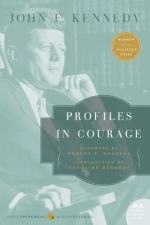
|
| Name: _________________________ | Period: ___________________ |
This test consists of 15 multiple choice questions and 5 short answer questions.
Multiple Choice Questions
1. What was Webster's justification for accepting political gifts and money?
(a) He used everything he collected for his favorite charities.
(b) He published his gifts in the newspaper.
(c) He considered them gifts from God and from voters or constituents who Webster believed were created in God's image.
(d) He shared the gifts with other Senators and Congressmen.
2. John Quincey Adams was a Senator from what state?
(a) New York.
(b) Virginia.
(c) Connecticutt.
(d) Massachusetts.
3. What was so strange about Henry Clay's enlisting Webster in his cause for compromise?
(a) Webster had given many speeches opposing Henry Clay.
(b) Clay had always opposed Webster in the Senate before.
(c) Clay was from the South and Webster was from the North.
(d) Clay was a republican and Webster was an independent.
4. In PROFILES IN COURAGE, what does John F. Kennedy fear the American public has forgotten?
(a) Where to look for courage in a politician.
(b) What courage actually is.
(c) How to tell if a man is honest.
(d) The basic principles our country was founded on.
5. Why was Webster a leader in the North prior to the Civil War?
(a) He was older than any other politician.
(b) He knew all the words in the dictionary.
(c) He had strong views against slavery.
(d) He could out talk his opponents.
6. What is the irony of Houston's defending the Northerner's rights to abolition?
(a) Houston disliked all Yankees.
(b) Houston was a slave to the Cherokee.
(c) Houston opposed slavery except in the South.
(d) Houston owned slaves himself.
7. John Quincey Adams' mother was fond of saying John had been groomed to do what?
(a) Become Chief Justice of the Supreme Court.
(b) Uphold the American legal system.
(c) Become a Puritan minister.
(d) Write great books.
8. How did one reporter categorize elected officials?
(a) That people thought everything they said was untrue.
(b) That they needed to be good public speakers.
(c) That people elected them on their looks.
(d) That they were gluttons for mental punishment.
9. What traits indicate that Adams suffered common human emotions?
(a) Adams secret life of debauchery.
(b) Times of disappointment and hurt at loss of popularity.
(c) His hate and retribution against his enemies.
(d) Lapses in his Puritanical beliefs.
10. For what prestigious university did Adams once work as a professor?
(a) Harvard.
(b) Princeton.
(c) Dartmouth.
(d) Yale.
11. What measure did Henry Clay enlist Webster to help with?
(a) Speaches warning about Abraham Lincoln's political ambitions.
(b) The Great Compromise of 1850.
(c) Clay's bid for re-election.
(d) Re-writing the Bill of Rights to include slavery.
12. What effect did Webster's three-hour-long speech in the Senate have in 1850?
(a) It made many political allies for Webster.
(b) It helped hold off the Civil War for a good ten years.
(c) It rallied the North to declare war on the South.
(d) It gave the South the idea of secession.
13. What was one of Benton's favorite sayings about himself?
(a) Benton is a bull in a china shop.
(b) Benton always knows what is right.
(c) Benton will never compromise.
(d) Benton and Democracy are one and the same.
14. Where did Houston say he wanted it written that he loved his country, he was a patriot, and he was devoted to the Union.
(a) In the Dallas Herald.
(b) On the face of the Texas capitol building.
(c) On his tombstone.
(d) In the latest history books.
15. Who suggested that Senators were vulgar demagogues?
(a) An ambassador.
(b) A cabinet member.
(c) A preacher.
(d) A reporter.
Short Answer Questions
1. Why did Houston define himself as an old fogy?
2. What issue caused Benton finally to begin losing popularity in Missouri?
3. Who was the first son of a former president to become president of the U.S.?
4. What was the dichotomy concerning John Quincey Adams' father?
5. What metaphor does Kennedy use to describe the relationship between the elected official and the electorate?
|
This section contains 757 words (approx. 3 pages at 300 words per page) |

|




